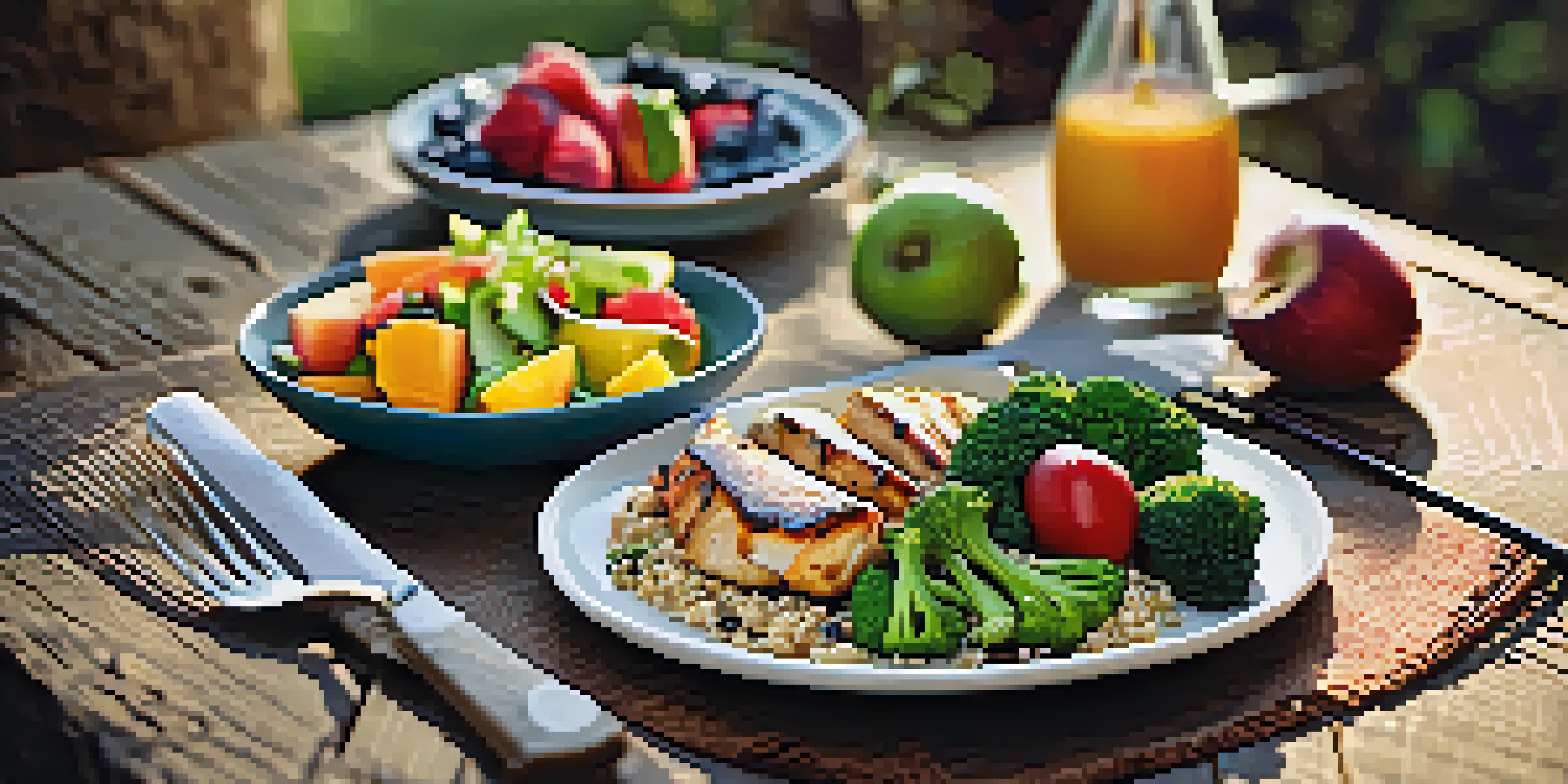Crafting a Gluten-Free Bodybuilding Meal Plan

Understanding the Basics of Gluten-Free Nutrition
Gluten-free nutrition focuses on eliminating gluten, a protein found in wheat, barley, and rye. For bodybuilders, this means finding alternative sources of carbohydrates, proteins, and fats that support muscle growth and recovery without compromising dietary needs. Understanding what foods are naturally gluten-free, like rice, quinoa, and legumes, is essential for crafting a balanced meal plan.
The greatest wealth is health.
Many athletes mistakenly believe that gluten-free diets limit their food options severely, but that's far from the truth. In fact, there are numerous gluten-free grains and protein sources available that can fuel intense workouts. Incorporating a variety of fruits and vegetables will also provide essential vitamins and minerals necessary for overall health.
Additionally, it's important to read labels carefully, as gluten can often hide in processed foods. Awareness of cross-contamination is crucial, especially for those with celiac disease or gluten sensitivity. Proper education about gluten-free options will empower bodybuilders to make informed choices.
Key Macronutrients for Muscle Building
When planning a bodybuilding meal plan, macronutrients—proteins, carbohydrates, and fats—play a vital role. Proteins are the building blocks of muscle, so incorporating gluten-free protein sources like chicken, fish, eggs, and legumes is essential. Each meal should aim for a good balance of these macronutrients to maximize muscle growth and recovery.

Carbohydrates provide the energy necessary for strenuous workouts, and gluten-free options like sweet potatoes, brown rice, and gluten-free oats are excellent choices. These foods not only give you energy but also help replenish glycogen stores post-workout. Healthy fats, which can be found in nuts, seeds, and avocados, are equally important as they support hormone production and overall health.
Embrace Gluten-Free Foods
Understanding and incorporating various gluten-free foods like quinoa, legumes, and fruits is crucial for bodybuilders to maintain a balanced diet.
Understanding the right proportions of macronutrients for your specific goals is key. It's often helpful to track your intake using apps or food diaries to ensure you're meeting your nutritional needs effectively. This way, you can fine-tune your meal plan as your bodybuilding regimen evolves.
Meal Timing and Frequency for Optimal Results
Meal timing and frequency are crucial aspects of a successful bodybuilding meal plan. Eating smaller, more frequent meals can help maintain energy levels and support muscle recovery. For example, consuming a meal every 3-4 hours can keep your metabolism revved up and provide a consistent supply of nutrients to your muscles.
Success is the sum of small efforts, repeated day in and day out.
Pre- and post-workout meals are particularly important. A well-balanced meal or snack containing both carbohydrates and protein about 30 minutes before a workout can enhance performance. Post-workout, aim to consume a meal rich in protein and carbs to help repair and rebuild muscle tissue.
Incorporating snacks like gluten-free protein bars or smoothies throughout the day can also help you reach your macronutrient goals without feeling overly full. The key is to listen to your body and adjust meal timing based on your energy levels and workout schedule.
Sample Gluten-Free Bodybuilding Meal Plan
Creating a sample meal plan can simplify the process of going gluten-free while bodybuilding. For instance, you might start your day with a breakfast of scrambled eggs with spinach and gluten-free toast. For lunch, consider grilled chicken with quinoa and steamed broccoli—a balanced meal that fuels your body for the day ahead.
Snacks are also important; a mid-afternoon option could be Greek yogurt with berries and a sprinkle of gluten-free granola. Dinner might include salmon, sweet potatoes, and asparagus, ensuring a well-rounded meal rich in protein and healthy carbs. Don't forget about hydration; aim for plenty of water throughout the day.
Balance Macronutrients for Growth
Incorporating the right amounts of proteins, carbohydrates, and fats is essential to support muscle growth and recovery in a gluten-free meal plan.
Feel free to adjust the sample plan according to your preferences and dietary needs. Experimenting with different gluten-free foods can keep your meals exciting and prevent burnout. The goal is to create a diverse and enjoyable eating experience that supports your bodybuilding efforts.
Incorporating Supplements into Your Meal Plan
Supplements can be a valuable addition to a gluten-free bodybuilding meal plan, especially when it comes to meeting protein needs. Gluten-free protein powders, such as whey, casein, or plant-based options like pea protein, can help you achieve your macronutrient goals. They’re convenient for on-the-go meals or post-workout recovery shakes.
However, it's essential to choose high-quality supplements that are certified gluten-free to avoid any contamination. Always read the label and do your research on the brand’s practices. Supplements should complement, not replace, whole foods in your diet.
Other supplements to consider include branched-chain amino acids (BCAAs) and omega-3 fatty acids, which can further support recovery and overall health. As always, consult with a healthcare professional or a nutritionist for personalized advice tailored to your specific bodybuilding goals.
Common Mistakes to Avoid on a Gluten-Free Diet
Transitioning to a gluten-free diet can come with challenges, and avoiding common pitfalls is crucial for success. One mistake many make is relying too heavily on gluten-free processed foods, which can be high in sugar and unhealthy fats. Instead, focus on whole, nutrient-dense foods that provide the energy and nutrients your body needs.
Another common error is neglecting to balance macronutrients, leading to insufficient protein or carbohydrates. It's important to plan meals that include an appropriate amount of each macronutrient to support your bodybuilding goals. Keeping a food diary can help identify areas needing improvement.
Stay Consistent and Motivated
Maintaining motivation through realistic goal-setting and community support is key to long-term success on a gluten-free bodybuilding journey.
Lastly, be cautious about cross-contamination if you’re cooking for yourself and others. Always use separate utensils and cooking surfaces to avoid gluten exposure. By being mindful of these common mistakes, you can create a more effective gluten-free bodybuilding meal plan.
Maintaining Motivation and Consistency
Staying motivated on a gluten-free bodybuilding journey can sometimes be challenging, but it’s essential for long-term success. Setting realistic goals, both short-term and long-term, can help you stay focused. Celebrate small victories, whether it's hitting a new personal record or trying a new gluten-free recipe.
Joining a community, whether online or in-person, can provide additional support and motivation. Sharing experiences and tips with others who are also navigating gluten-free bodybuilding can keep you inspired. Consider following gluten-free bodybuilders on social media or engaging in forums to foster connection.

Finally, be flexible with yourself. It’s okay to have off days or indulge occasionally, as long as you get back on track. Consistency is key, but so is enjoying the process. Keep exploring new foods and recipes to maintain excitement in your meal plan and stay committed to your goals.